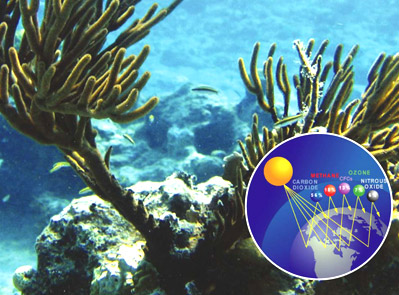Trace gas flux studies from coastal systems
The reliability of predictions on future climate change is intimately linked to the quantification of the present-day fluxes of climatically active trace gases (CO2, N2O, CH4, DMS, COS, CS2, halogenated and oxygenated volatile organic compounds) between atmosphere, land and ocean reservoirs, the understanding of the biogeochemical drivers of these fluxes, and their responses to anthropogenic forcing. The importance of the fluxes of climatically active trace gases between the coastal ocean and the |
|
atmosphere has only very recently been recognized by the scientific community. Tentative global and regional integrations based on sparse data-sets show that the coastal ocean plays a major role in the overall source/sink budgets of these gases. Nevertheless, these budgets remain highly uncertain, in large part due to poor data coverage and a spatially bias towards tropical latitudes.
IOM undertakes an integrated and comprehensive study of climatically active trace gases dynamics focused on coastal environments, to maintain Indian research in this field at international competitive level. The Institute brings together cross-cutting scientific issues, working on different ecosystems and on different aspects of climatically active trace gases atmospheric fluxes (distribution, biogeochemical drivers, gas transfer velocity and future evolution under environmental changes). IOM’s ongoing/planned research initiatives provide estimates of fluxes of climatically active trace gases in ecosystems that have been under-sampled and neglected so far in global budgets. |

